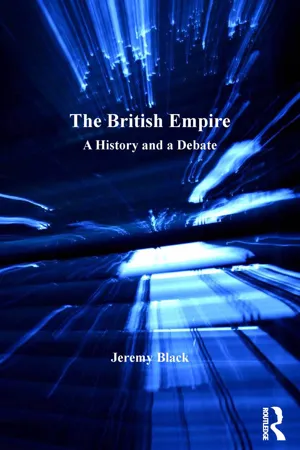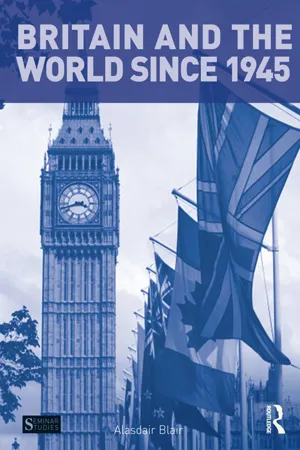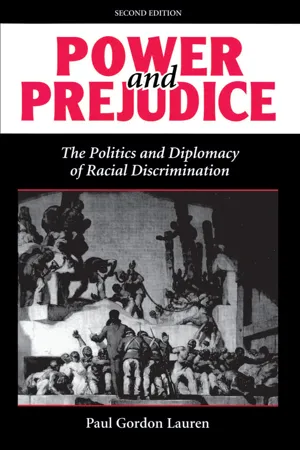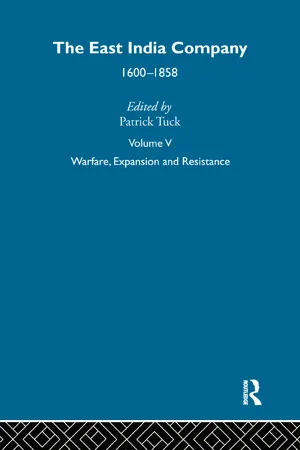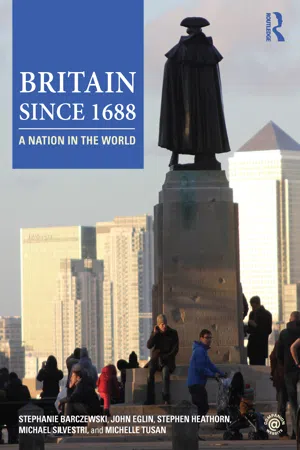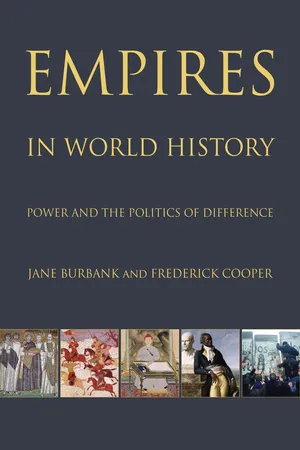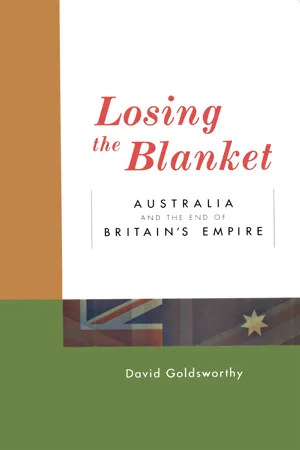History
End of British Empire
The end of the British Empire refers to the period of decolonization and the relinquishment of imperial control by Britain over its colonies and territories. This process occurred primarily in the mid-20th century, with many former colonies gaining independence through peaceful negotiations or, in some cases, through armed struggle. The end of the British Empire marked a significant shift in global power dynamics.
Written by Perlego with AI-assistance
Related key terms
8 Key excerpts on "End of British Empire"
- eBook - ePub
The British Empire
A History and a Debate
- Jeremy Black(Author)
- 2016(Publication Date)
- Routledge(Publisher)
Chapter 5The British Empire, 1900–1945
From the perspective of the end of the British empire, the twentieth century might seem to be a case of decline, obsolescence, and inevitability. Moreover, if empire is the past, it can be understandable to focus on themes that appear more familiar today, notably the rise of the welfare state and Britain’s post-imperial situation, particularly the relationship with the European Union. This, however, would be not only less than a full account and one that fails to pay due attention to the experience of the past. It would also present a misleading coherence in the discussion of British history and the fate of the empire. Indeed, it is important to note complexities in developments and ambiguities in analysis, to avoid anticipating decline and crisis, and to be aware of the problematic character of any assumptions of inevitability. Commentators in the eighteenth century focused on the moral aspects of strength and ideology, and saw the seeds of imperial decline in self-indulgence and a lack of public spirit, notably in the response to Edward Gibbon’s Decline and Fall of the Roman Empire (1776–88).In contrast, their twentieth-century counterparts, although also ready to look for moral aspects, were more predisposed to search out economic causes for decline. Here a crisis can, and could, be discerned for Britain from the late nineteenth century, in large part because of American and German economic growth, in both quantitative and qualitative terms. No longer the world’s leading economic power, how could Britain expect to be the leading empire? This argument can then be traced forward to note the interaction between economic decline and the strains of international competition, as armaments and war placed a formidable burden on the economy and, even more, the public finances. Moreover, the difficulties of both made it harder to sustain Britain’s imperial position. This situation remains pertinent today as far as Britain’s international position is concerned, and will probably continue to be relevant in the future. - eBook - ePub
- Alasdair Blair(Author)
- 2014(Publication Date)
- Routledge(Publisher)
Britain’s imperial influence was achieved by a mix of formal power through colonies and Dominions and informal power through economic influence over many other countries. The legacy of the British Empire continues to this day. From language to literature, economics to politics and the military to the sports field, Britain’s influence can be seen throughout the world. The legacy of Empire can also be found in the migration of peoples. In some instances this was forced, such as through the slave trade between Africa and North America and in the transportation of convicts to Australia. But in other instances it was encouraged, such as the settlement of Canada or the movement of traders from India to Africa in search of new commercial ventures. This would in turn have an impact on Britain in future years, with decolonisation resulting in significant immigration in the post-war era that was marked by the arrival of the SS Windrush at Tilbury docks on 22 June 1948 carrying nearly 500 Caribbean immigrants to Britain. Decolonisation: The process of colonial powers granting independence to their former colonies. Many of the countries that have been granted independence have suffered from poor economic and political governance and while the roots of such problems can be traced back to the colonial authorities, it is also the case that the decolonised countries have not always benefited from democratic governments. In looking at these issues, this study provides an overview of the post-1945 period by chronicling the key episodes and decisions that have shaped Britain’s foreign policy, with a notable focus on the relative nature of Britain’s decline - eBook - ePub
Power And Prejudice
The Politics And Diplomacy Of Racial Discrimination, Second Edition
- Paul Gordon Lauren(Author)
- 2018(Publication Date)
- Routledge(Publisher)
26 It did exactly this. For more than one hundred years India had been regarded as the keystone and crown jewel of the British Empire and, in some cases, the raison d'être for much of the rest of the empire. Thus, once power changed hands there, other areas could be seen in a much different light. Within only a few months, therefore, Britain relinquished control of further imperial possessions as well. In January 1948 it granted independence to Burma and in February gave national freedom to Ceylon (now Sri Lanka). Before the year was out, Britain also withdrew in the Middle East from Palestine, setting into motion events that would make it possible for survivors who had suffered so much from the Holocaust to create the modern state of Israel. With this action of 1948, the British ended the first phase of their new and revolutionary postwar decolonization. The speed of these policies had been so great and the contrast with the past so sharp that they needed time to adjust, time to see whether their strategy of supporting moderate nationalists would prevent the rise of anti-British extremists, time to decide whether their attitudes toward race could change, and time to determine what they would do with the rest of their empire.This conscious decision by the British at least to begin the process of decolonization from part of their far-flung empire did not always inspire other European imperial powers to do the same. The Dutch, for example, tenaciously refused to give freedom to the Indonesians. Instead, they fought fiercely against guerrilla forces to retain their East Indian empire. In this action, they attracted the full blast of Communist verbal assaults against Western imperialism, anticolonial speeches within the United Nations, and then counteraction by others. Asian states, together with some from the Middle East, supported the nationalist movement of Sukarno, refused to allow planes from the Netherlands on the way with military supplies to Indonesia to use airfields, and joined in a boycott of Dutch ships. Then, believing strongly that the tide of history worked against any reimposition of empire, both India and Australia took the matter to the Security Council. The Dutch, finding themselves politically and diplomatically isolated from all but the European imperial powers, financially drained, and militarily weakened, finally gave up. In 1949 they granted independence to Indonesia, thus ending a colonial regime begun by the East India Company of Amsterdam three and a half centuries before.27 - eBook - ePub
- Ed Edwards(Author)
- 2023(Publication Date)
- Nick Hern Books(Publisher)
Luckily for the world, after World War II, the British realised how, during the Empire, there’d been instances of bad behaviour and racism, some of it shocking. So, despite their better judgement – and, yes, sometimes reluctantly – the British granted independence to the former Empire and went it alone.More often than not, the newly independent countries of the former Empire made a mess of governing themselves. But the British – with help from their good friends, the Americans – kept forces stationed all over the world for just such an eventuality.If things got too far out of hand, the British could – and still do – intervene to save their former subjects from themselves and from each other – and especially from other dark forces such as Chinese Dictators, Bloodthirsty Russians, or Assorted Religious Fanatics who oppress women and LGBTQ+ people.This mission to save the world from itself is a great responsibility that can involve the British in tricky moral and political dilemmas. But we’re determined to see decency and democracy maintained the world over. We’re good like that. It’s who we are and who we’ve always been underneath it all.Some version or other of this myth is propagated 24/7 in the West – with big results. Huge swathes of Westerners believe it, or something like it, with adjustments for political creed. Even some socialists. In other words, most Westerners believe that the end of the colonial period meant the end of imperialism. Imperialism being the political and/or economic domination of smaller or weaker countries by powerful ones for the benefit of the powerful ones.What really happened? Concerning Violence II The end of the Empire was a bloodbath.After World War II, hundreds of millions of people in the colonies across Africa and Asia rose up to free themselves from European rule. The rebellions were inspired in part by Western anti-fascist slogans, partly by the Soviet Red Army’s stunning victories against Nazism in Europe, but mostly by their own brutal oppression at the hands of Europeans. - eBook - ePub
- Henry Stevens(Author)
- 2021(Publication Date)
- Routledge(Publisher)
ANCIEN RÉGIME: COLONIAL WAR IN INDIA, 1798–1818 DOI: 10.4324/9781003101024-9Dirk H. A. KolffThe age of modern imperialism is mainly characterised by the abortive attempts of a number of European continental powers to emulate Great Britain and create a colonial structure that could be compared – if only remotely – with the British Indian empire in Asia. After 1870, it is true, the British at times allowed themselves to be as much carried away by imperialistic feelings as the states on the continent. Yet, their empire was acquired long before the scramble for Africa – or, for that matter, any other European scramble for colonial territory – began. By 1870, indeed, the classical period of British imperialist warfare was long over. Britain’s empire was a Bonapartist, not a Wilhelminic achievement. But, apart from timing, there were other differences between British empire building and European imperialism. In size and number of inhabitants British India was so huge that any endeavour to establish a rival to it would have to be undertaken either in China or in the Americas. No European power really ever attempted such a thing. Instead, until the end of the colonial era, European energies turned to Africa, there to scrape the bottom of the world’s barrel, to use Gallagher and Robinson’s apt phrase.In yet another respect India stood alone. Conquered at a time in which the old mercantilist rivalry for empire gave way to the imperialism of free trade, its value for Britain would, paradoxically, no longer be found in its export products, nor in its markets for imports. In the nineteenth century, it would owe its significance firstly to the fiscal exploitation of its agrarian, but highly monetized economy and its vast internal markets. British India became first and foremost an agrarian rather than a commercial empire. Secondly, British India would be unique because of its strategic position in the Indian Ocean, an importance that was enormously enhanced by its limitless human resources, i.e. its 200 million people, the vast majority of whom would by 1818 be absorbed into the state of the English East India Company. As an agrarian economy and as a market for peasant and military labour, India likened only to that other British peasant colony, Ireland, i.e. before it was hit by the agricultural and demographic crisis of the 1840s. With respect to the second of these two features – the significance of the Indian military labour markets – two questions must be asked. Firstly, had this always been a characteristic of the Indian ancien régime - eBook - ePub
Britain since 1688
A Nation in the World
- Stephanie Barczewski, John Eglin, Stephen Heathorn, Michael Silvestri, Michelle Tusan(Authors)
- 2014(Publication Date)
- Routledge(Publisher)
On the battlefield, a crucial turning point in the war was the Continental Army’s defeat of British forces at the Battle of Saratoga in October 1777. This demonstration that the colonists could win a victory in the field convinced France to enter the war on their side the following year. France’s entry forced the British to contend with their navy. British troops and ships had to be sent to defend the colonies in the Caribbean; by the end of the war, almost half of the British navy was stationed there. British slave-trading bases in West Africa were occupied by the French, and the British were also forced to defend their Mediterranean possessions of Gibraltar and Minorca. The French even attacked the Isle of Jersey in the English Channel and threatened to invade both England and Ireland. By the end of the war, the British were fighting against the Spanish and Dutch as well as the French, without any European allies to counterbalance this alliance. The British were able to put almost 400,000 men under arms, including British, Hessian and Hanoverian troops, American loyalists, American Indian allies, and Indian sepoys. But even this was not enough to secure victory. By 1782, the British had ceased military operations in North America, and the following year the Treaty of Paris confirmed the independence of the American colonies.Imperial resurgence: The second British Empire in IndiaThe end of the American Revolution in 1783 marks a divide in the history of British imperial expansion between what historians have termed the First and the Second British Empires. Fears that the loss of the American colonies would result in a collapse of the rest of the Empire quickly proved unfounded. In the decades following the American Revolution, Britain’s overseas empire expanded dramatically in Asia and the Pacific, in the latter case into regions that were unknown to Europeans prior to the final quarter of the eighteenth century. In 1750, the population of the British Empire had been around 12.5 million people. By 1820, it had reached 200 million, approximately one-quarter of the earth’s population.This “new” empire was not entirely new, however, and historians caution against regarding 1783 as a sharp dividing line. In India, as we have seen, the transformation of the East India Company into a territorial power was already well underway prior to the American Revolution. Yet it is the case that the Second British Empire encompassed new lands and engendered new ideas about how the British ought to govern their overseas territories. In general, the lesson that Britain’s political leaders drew from the American Revolution was that their governance of the North American colonies had been too lenient. More authoritarian forms of government were thus developed. In Canada, for example, when colonial legislatures were established for Upper (Anglophone) and Lower (Francophone) Canada, they were made subordinate to a colonial governor appointed by Britain. - eBook - ePub
Empires in World History
Power and the Politics of Difference
- Jane Burbank, Frederick Cooper(Authors)
- 2021(Publication Date)
- Princeton University Press(Publisher)
13 END OF EMPIRE?W hen did the world of empires come undone? Or did it? World War I had ended some empires and shaken others, but the victorious imperial powers were able to reaffirm their legitimacy and add new territories. By the 1930s, the ambitions of empire-builders were tearing up the world again. World War II resulted in the defeat of Germany and Japan and the weakening of French, British, and Dutch empires; this moment might be seen as the beginning of the end. But the leaders of the surviving empires did not think so. France and Britain began efforts at “development” to invigorate their economies and enhance imperial legitimacy. Inside empires, political activists mobilized against imperial rule, sometimes hoping to create states based on national will, sometimes trying to turn empire into another kind of supranational polity—a federation, a union, or a confederation. For some, world revolution was the goal, folding the liberation of “peoples” into the liberation of “the people” in a new international order. Most political leaders in 1945 felt that the world was changing, but few could see what direction change would take.The mid-twentieth century was not a self-propelled movement from empire to nation-state. Ideas and practices of layered sovereignty and of varying degrees of self-rule within overarching structures were still in play. France and Britain were threatened not only by the specter of anticolonial revolution should they fail to convince their subjects of the advantages offered by imperial institutions, but also by the danger of succeeding at this goal—and thereby producing imperial citizens who would demand social and economic resources equivalent to those enjoyed by metropolitan citizens in the era of the welfare state. The colonialism that collapsed in Africa and Asia in the 1950s and 1960s was not the conservative variant of the interwar decades but a colonialism that was interventionist, reformist, and accordingly open to challenge. - eBook - ePub
Losing The Blanket
Australia and the end of Britain's Empire
- David Goldsworthy(Author)
- 1998(Publication Date)
- Melbourne University Press Digital(Publisher)
PART IICoping with the end of empire
T HE ISSUES DISCUSSED in Part I were not the weightiest in Anglo-Australian relations in the 1950s. They did not rank in importance with Anglo-Australian military cooperation in ANZAM, SEATO and the Commonwealth Strategic Reserve; with the crisis in French Indochina; with the Suez crisis; or with collaboration on nuclear issues. They were nevertheless strands in the geopolitical tapestry, interweaving with other strands. Indeed, many of the Anglo-Australian interactions bearing upon the problems of late colonialism bore also upon Britain’s and Australia’s wider geopolitical concerns. Thus the study of these interactions in Part 1 provided a perspective on the larger relationship.Part II concentrates on the 1960s, the decade in which what had been the greatest of the European formal empires—the British and the French—along with the Belgian and the remnants of the Dutch and the Italian (though not yet the Spanish or the Portuguese), all but disappeared from the world map. This was historical change on a colossal scale; indeed, in Darwin’s view,The most profound change in world politics in the fifty years since the end of the Second World War . . . For most of the world’s population this great transformation has been more immediate, more lasting and more fundamental in its effects than the events that dominate the Western view of post-war international politics, above all the Cold War.1In Britain’s case, the sheer scale and speed of the change cannot be overemphasised. The first great wave of British divestment had rolled through South Asia and the Palestine Mandate in 1947–48. In the next dozen years only three territories under British purview attained independence: the Anglo-Egyptian condominium of the Sudan, and the colonies of Ghana and Malaya. But then a second great wave began. From 1960 the British Government began to accelerate the pace of change, providing places in the decolonisation queue even for territories previously seen as considerably less than ‘viable’. The result was that almost all the British territories in Africa, the Caribbean, South America, the Pacific, Southeast Asia, the Middle East and the Mediterranean—some twenty-eight countries—became independent in the space of eight years.
Index pages curate the most relevant extracts from our library of academic textbooks. They’ve been created using an in-house natural language model (NLM), each adding context and meaning to key research topics.
